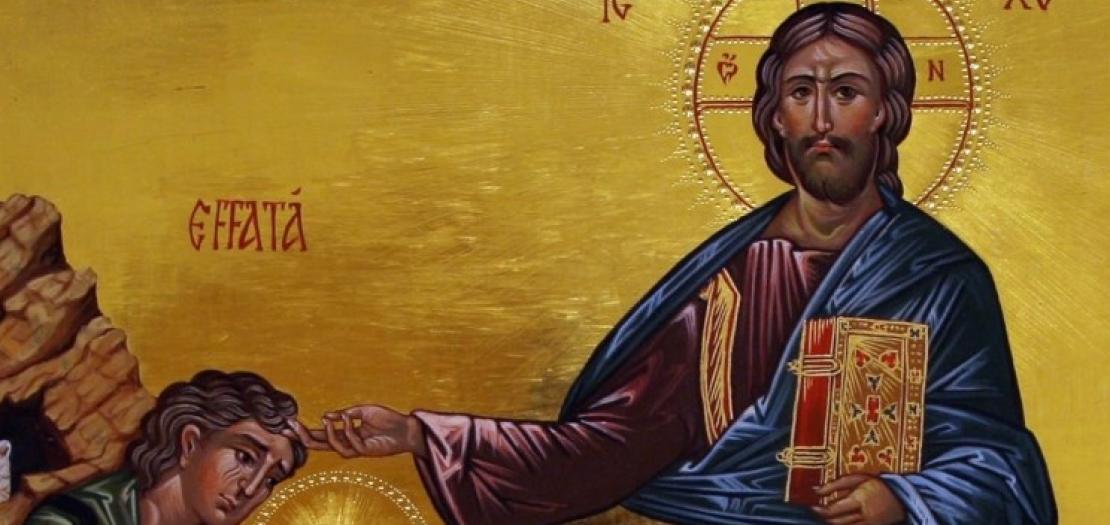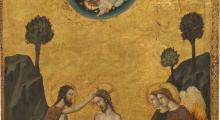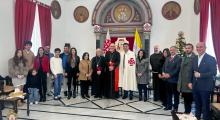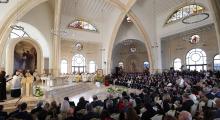Issued by the Catholic Center for Studies and Media - Jordan. Editor-in-chief Fr. Rif'at Bader - موقع أبونا abouna.org

Following is the text of meditation by Cardinal Pierbattista Pizzaballa, Latin Patriarch of Jerusalem for the 23rd Sunday of ordinary time, dated September 8, 2024
In today’s Gospel passage, (Mark 7:31-37) the protagonist is a man who is deaf and mute.
There is a profound symbolism found in an individual afflicted with an incurable disease: If human existence relies on relationships, which are formed only though communication, thus through speech, then we can deduce that this man is half alive. He is unable to listen, nor express himself, he lives in a world of his own, isolated from everyone else.
Every illness was seen as a curse resulting from sin, as there needed to be someone to blame for this perceived flaw or imperfection in creation. It certainly wasn't God, who makes all things well.
This hopeless man is presented with hope despite his inability to see it through his own darkness. His hope comes through certain unnamed figures who facilitate his healing. These people transcend mere resignation and apathy, taking on the responsibility of hoping for those who cannot muster hope themselves. They bring the sick man to Jesus and plead with Him to heal him. (Mark 7:32)
At this moment, Jesus can take action, and He does so with a series of gestures that we will examine closely.
The first action Jesus takes is to separate the deaf-mute from the crowd (Mark 7:33). This might seem paradoxical since the man is already isolated and disconnected from the world. By removing him further, Jesus seems to create an even greater sense of isolation.
This man is already on the margins, and Jesus meets him there. Jesus enters our isolation, our inability to relate, our wounded humanity. He draws us out and saves us, but not before immersing Himself in our condition alongside us.
The second step is to make gestures. (Mark 7:33) Although the man was deaf and mute and could not hear any words, he was able to see what Jesus was doing.
God's salvation is conveyed through His actions, symbolized by His hands and fingers. The terms "hands and fingers of God" appear throughout both the Old and New Testaments to signify the power of divine intervention that sustains and gives life.
Jesus first restores hearing: for a man to be able to speak, he must first be able to hear, and Jesus starts from there, from interrupted hearing. He does not apply medicine to him, He touches him with His own hand, because He Himself is the medicine, and the cure comes from Him.
Jesus begins by restoring the man’s hearing, as the ability to speak depends on the ability to hear. He addresses the issue of impaired hearing first. Instead of applying medicine, Jesus touches him with His own hand, because He Himself is the source of healing, and the cure comes directly from Him.
Finally, Jesus utters a single word: "Ephphatha," which means "Be opened". (Mark 7:34)
Salvation, therefore, is about opening up, since illness represents a form of closure: closing off from life, relationships, hope, the future, and trust. Jesus restores this openness, and He does so with a sigh and a breath—a possible reminder of the original creation when God breathed life into man.
The fruit of this healing is captured in a detail found in verse 35: the healed man can finally hear and speak, but the evangelist specifies that the man speaks “plainly”.
Why this clarification?
We might say that our speech is considered correct when it accurately reflects what God has accomplished in us.
All other words are "incorrect" in a sense; they are ineffective because they fail to convey what they have heard and seen, and do not fulfill their true purpose, which is to proclaim God's mercy toward us.
Finally, Jesus instructs those present not to tell anyone about what has happened. (Mark 7:36)
Because only those who have personally experienced it—the one who has been on the margins and has learned again to listen and speak correctly—can truly testify to what happened.
But also because if before the miracle the sick man did not have the ability to speak correctly, he now has the responsibility: no one now can do what is solely his responsibility, which is to “open up” and bear witness to the hope that saved him, so that others may then be led to Jesus.
Moreover, before the miracle, the sick man lacked the ability to speak correctly, but now he bears the responsibility. No one else can fulfill this duty for him—he must "open up" and bear witness to the hope that saved him, so that others may then be led to Jesus.
“He has done all things well” (Mark 7:37): in this way creation is also restored.
+Pierbattista







